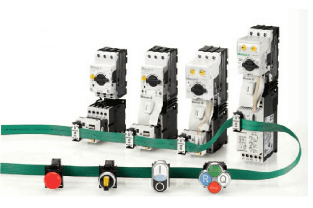Eaton Industrial Switchgear
PLHT-D80/3
MCB 80A 20kA Type D TP
Trade Price
£202.32
Per
1
Unit
EACH
Pack Quantity
1




Information
Eaton Moeller series xPole - PLHT/-V MCB. Miniature circuit breaker (MCB), 80A, 3p, D-Char, AC
Technical Specifications
Product Length/Depth
90 mm
Product Height
75 mm
Product Width
81 mm
Product Weight
0.64 kg
Compliances
RoHS conform
Application
Switchgear for industrial and advanced commercial applications
Number of poles
Three-pole
Number of poles (total)
3
Number of poles (protected)
3
Tripping characteristic
D
Release characteristic
D
Amperage Rating
80 A
Type
Miniature circuit breaker
PLHT
Voltage type
AC
Rated operational voltage (Ue) - max
400 V
Rated insulation voltage (Ui)
440 V
Rated impulse withstand voltage (Uimp)
4 kV
Frequency rating - min
50 Hz
Frequency rating - max
60 Hz
Rated switching capacity (IEC/EN 60947-2)
20 kA
Rated short-circuit breaking capacity (EN 60898) at 230 V
0 kA
Rated short-circuit breaking capacity (EN 60898) at 400 V
0 kA
Rated short-circuit breaking capacity (IEC 60947-2) at 230 V
20 kA
Rated short-circuit breaking capacity (IEC 60947-2) at 400 V
20 kA
Overvoltage category
III
Pollution degree
2
Width in number of modular spacings
4.5
Built-in depth
75 mm
Degree of protection
IP20
Connectable conductor cross section (solid-core) - min
2.5 mm²
Connectable conductor cross section (solid-core) - max
50 mm²
Connectable conductor cross section (multi-wired) - min
2.5 mm²
Connectable conductor cross section (multi-wired) - max
50 mm²
Rated operational current for specified heat dissipation (In)
80 A
Heat dissipation per pole, current-dependent
0 W
Equipment heat dissipation, current-dependent
21.4 W
Static heat dissipation, non-current-dependent
0 W
Heat dissipation capacity
0 W
Ambient operating temperature - min
-25 °C
Ambient operating temperature - max
55 °C
10.2.2 Corrosion resistance
Meets the product standard's requirements.
10.2.3.1 Verification of thermal stability of enclosures
Meets the product standard's requirements.
10.2.3.2 Verification of resistance of insulating materials to normal heat
Meets the product standard's requirements.
10.2.3.3 Resist. of insul. mat. to abnormal heat/fire by internal elect. effects
Meets the product standard's requirements.
10.2.4 Resistance to ultra-violet (UV) radiation
Meets the product standard's requirements.
10.2.5 Lifting
Does not apply, since the entire switchgear needs to be evaluated.
10.2.6 Mechanical impact
Does not apply, since the entire switchgear needs to be evaluated.
10.2.7 Inscriptions
Meets the product standard's requirements.
10.3 Degree of protection of assemblies
Does not apply, since the entire switchgear needs to be evaluated.
10.4 Clearances and creepage distances
Meets the product standard's requirements.
10.5 Protection against electric shock
Does not apply, since the entire switchgear needs to be evaluated.
10.6 Incorporation of switching devices and components
Does not apply, since the entire switchgear needs to be evaluated.
10.7 Internal electrical circuits and connections
Is the panel builder's responsibility.
10.8 Connections for external conductors
Is the panel builder's responsibility.
10.9.2 Power-frequency electric strength
Is the panel builder's responsibility.
10.9.3 Impulse withstand voltage
Is the panel builder's responsibility.
10.9.4 Testing of enclosures made of insulating material
Is the panel builder's responsibility.
10.10 Temperature rise
The panel builder is responsible for the temperature rise calculation. Eaton will provide heat dissipation data for the devices.
10.11 Short-circuit rating
Is the panel builder's responsibility. The specifications for the switchgear must be observed.
10.12 Electromagnetic compatibility
Is the panel builder's responsibility. The specifications for the switchgear must be observed.
10.13 Mechanical function
The device meets the requirements, provided the information in the instruction leaflet (IL) is observed.
Current limiting class
3
Features
Additional equipment possible
Special features
Ambient temperature hint: a 1 °C increase results in a 0.35% linear reduction of current carrying capacity
Document Links
Datasheet

